When the praises go up, the blessings come down
It seems like blessings keep falling in my lap
From “Blessings,” Coloring Book, Chance the Rapper
As I wrote about in my last post, blessings within Judaism are not necessarily set in stone; they can and have been adapted to reflect contemporary societal and cultural needs. In this follow-up post, I mean to touch on how the very concept of what a prayer/blessing in Judaism is might also be susceptible to change.
Our final exercise with Adam during our class on brachot was to write a new blessing of our own and then to find a way to illustrate it. I didn’t really write a blessing, and the illustration I went with is admittedly pretty unclear without explanation. At the center of my page I did my best to write a Hebrew Aleph—the first letter of the alphabet, unpronounced, mysterious, and central to a story by one of my favorite fiction writers, Jorge Luis Borges. All around it I scribbled in an asemic script that I’ve used to doodle with since high school. The idea behind it was that I’m interested in silence and in meaninglessness—in the tension between our observation as human beings of a senseless, chaotic universe and the search for meaning that is fundamental to our nature, and in the seeming unresponsiveness of the void. While it might seem like a bleak outlook, it is in those two places that I most readily and consistently locate my understanding of God. So I’m interested, as well, in the idea of nonverbal blessings, in prayer that is not based in language, and in the potential to connect to something higher through that. One place where I see the most potential for this is in meditation.
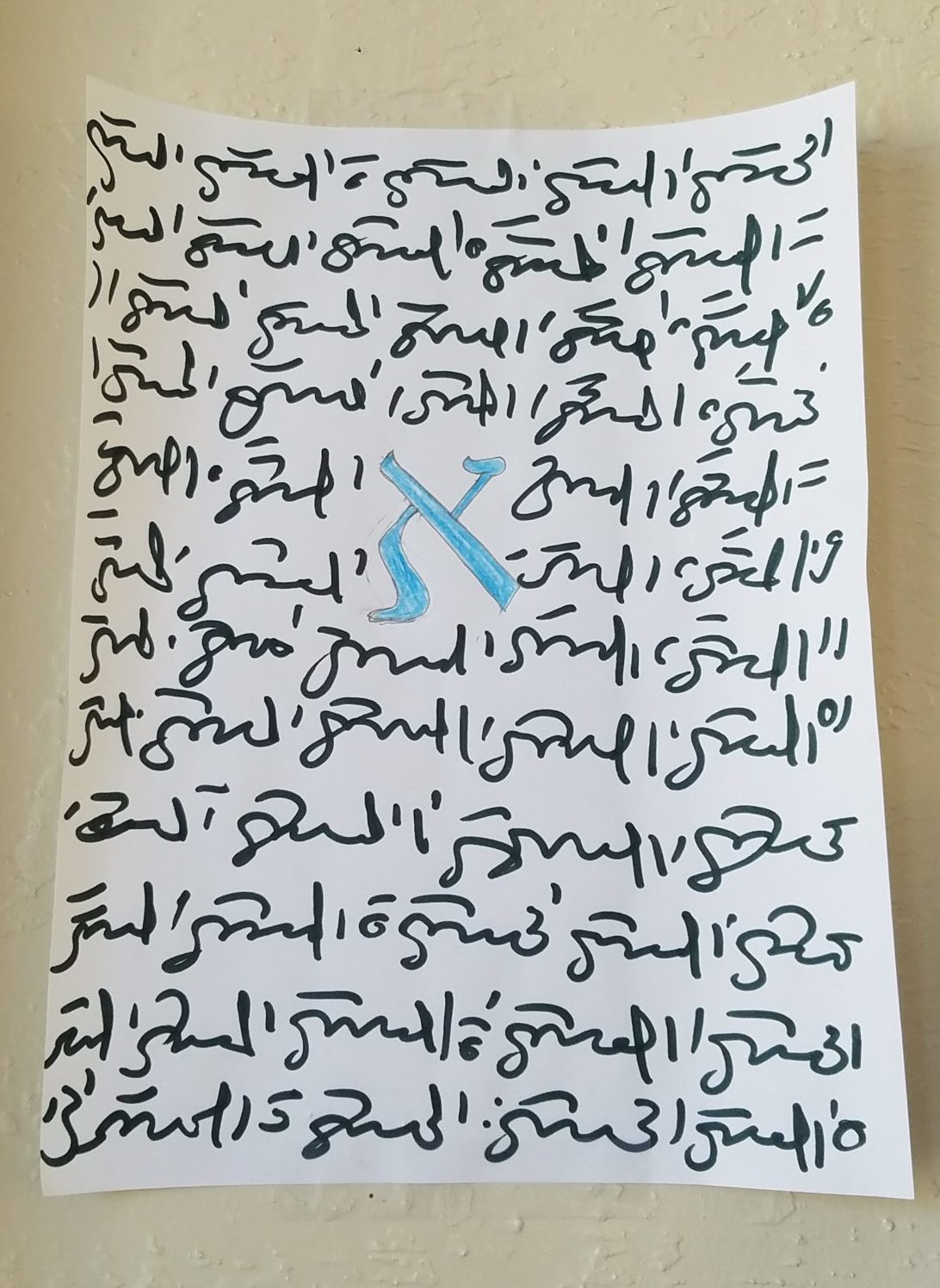
In his book Jewish Meditation, Rabbi Aryeh Kaplan lays out the foundations for what he considers to be an indigenous Jewish meditative tradition, one that is deeply steeped in Kabbalah (a form of Jewish mysticism) and rooted, as it turns out, in prayer. For instance, Rabbi Kaplan suggests meditating on certain Hebrew phrases and Jewish prayers in a similar fashion to how one might use a mantra in Buddhist meditation practices (Kaplan 62). He also talks at length about the ecstatic prayer practices of the Chasidic movement (a Kabbalistic Orthodox sect), linking them to meditation in their ability to produce altered states of consciousness (Kaplan 48). Both meditation and prayer are capable of producing in the practitioner “altered states of consciousness,” and this forms the crux of Rabbi Kaplan’s argument that Judaism has its own indigenous meditative practice. He goes so far as to present meditation as an integral component of many biblical narratives and experiences of Jewish prophets and mystics, arguing that it is the “states of consciousness” engendered by meditative practices that we associate with the “enhanced spiritual experiences… experienced by prophets and mystics.” He claims that it is in “meditation” that “the feeling of the Divine is strengthened, and a person can experience an intense feeling of closeness to God” (Kaplan 38). To read Kaplan is to be left with the impression that, without meditation, Judaism as we understand it would not exist, and that prayer is itself a form of meditative practice already.
Rabbi Kaplan’s view on Jewish meditation is perhaps controversial. Personally, I find it problematic that he insists that Jews stick strictly to “Jewish” forms of meditation while avoiding “non-Jewish” (i.e. Buddhist and Hindu, among other traditions) forms due to an insinuated association with “idolatry.” This is problematic especially given the fact that his understanding of meditation as a white American writing in the 1980’s was clearly inflected by Western, appropriated understandings of Eastern traditions. Nonetheless, his writings on the topic open up an interesting dialogue on the relationship between saying blessings and sitting for meditation, and on the shared goals of both practices.
Why do we pray? During a session with Rabbi Dev Noily from Kehilla in Oakland, we learned of four basic types of prayers that people make: prayers of gratitude, prayers to make request, prayers asking for forgiveness, and prayers expressing awe. During our class back in June, Adam presented saying blessings as a way to slow down, be mindful, and check in with ourselves and the universe. Clearly, Adam and Rabbi Dev approach the topic of prayer from different directions, but I think there are ways to map one answer onto the other. After all, what’s the point of articulating one’s gratitude and/or awe if not to slow down and take a moment? Can’t we see the goal of “checking in” as being articulated by the idea of evaluating one’s needs and regrets, a way of evaluating our particular position in the nexus of space-time? Can’t we see meditation as fulfilling similar purposes?
When I think about meditation and the ways or reasons why I’ve integrated mindfulness practice into my life, I often frame it as a way of getting to better know my thoughts and mental landscape while also working towards the goal of transcending ego and connecting with a greater presence. As I’ve come to understand prayer through my experiences here, I see it in a similar way. Another aspect linking prayer and meditation is their relationships to tradition and community, both practices coming with their own long histories and an intrinsic quality of linking their practitioners to each other in a certain communal bond. In speaking and saying blessings (as well as meditating) with my cohort here at Urban Adamah, I’ve felt firsthand the power of these practices to unite groups and orient individuals within lineages of practitioners. Observing these common aspects shared by meditation and prayer, it strikes me that they’re not the only activities that I engage in that fulfill these needs, and it makes me wonder about the broad swathe of activities that could be potentially subsumed into the category of “blessings.” Two that seem particularly salient given my experiences here are physical work (farming) and activism.
Runners often talk about their “runners’ highs.” I’ve tried (and stopped trying) to be a runner. But for a while during my undergraduate career, I did work down in the stacks at UVA’s Special Collections Library, where most of my day consisted of being on my feet performing repetitive tasks such as putting books away in order on shelves or working with my hands to make cases to help preserve precious items. Nowadays, I’m a farmer, which, while intellectually engaging, also involves a lot of rote, physical tasks. In both cases, I’ve experienced the pleasure of losing myself in mechanical tasks, and the reward of connecting with something bigger than myself. At the Special Collections Library, that thing was history; at Urban Adamah, that thing is the Earth. In both cases, these experiences have helped me to better understand the way that I am constituted and the position I take within the world. Similarly, activism for me has involved a lot of repetitive action (marching and chanting for hours, sitting through long and frustrating meetings that go in circles, learning and unlearning and challenging my perceptions) that have, in certain moments, brought me to elevated heights, helped me to feel more connected to my community, and better understand myself as a body navigating society and a subjectivity existing within the context of history. Perhaps this is too liberal an application of the concept of prayer, but I tend not to shy away from being too far to the left on any issue. I believe that prayer can be a lot of things, and that language is only the beginning.
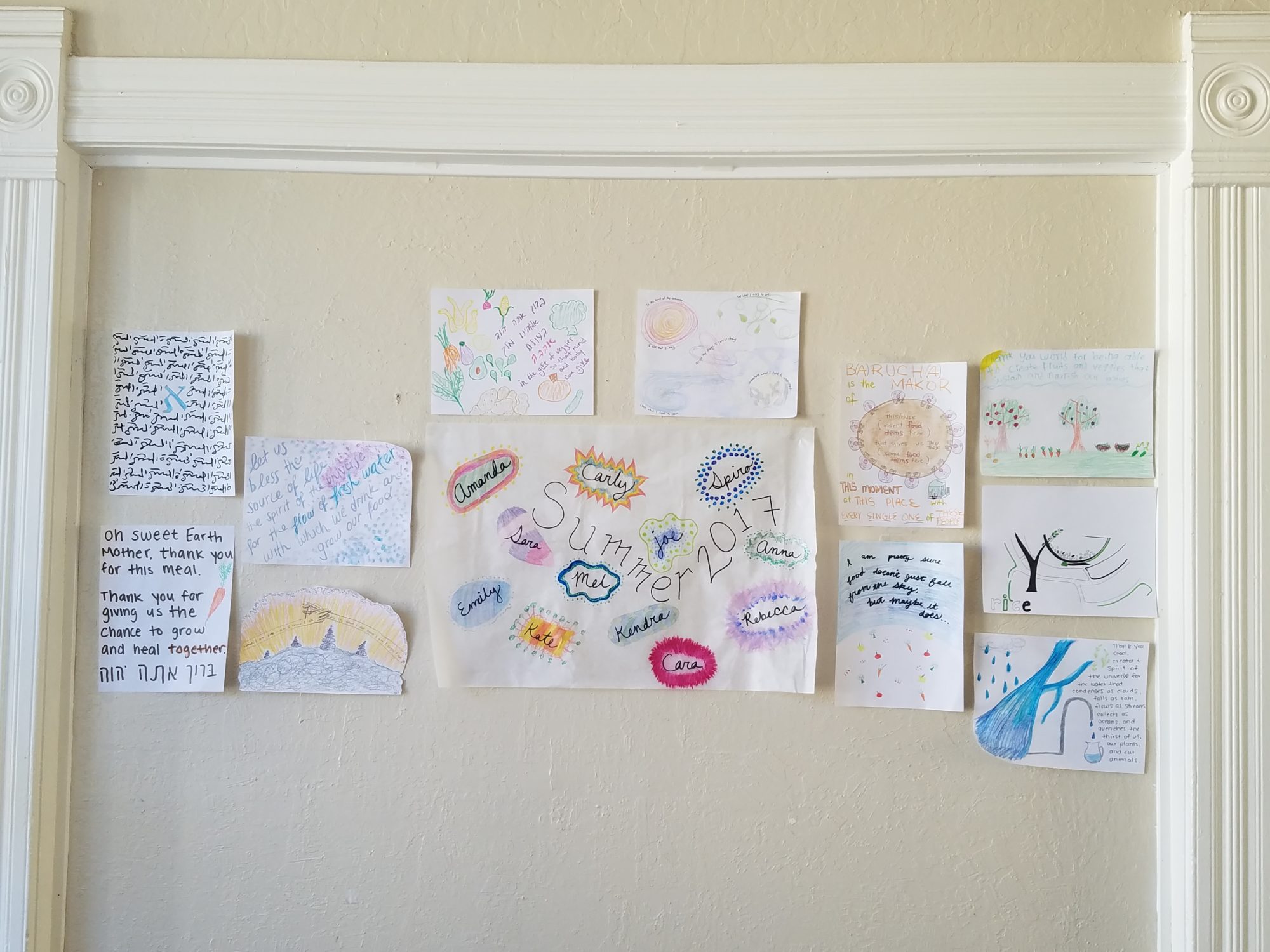

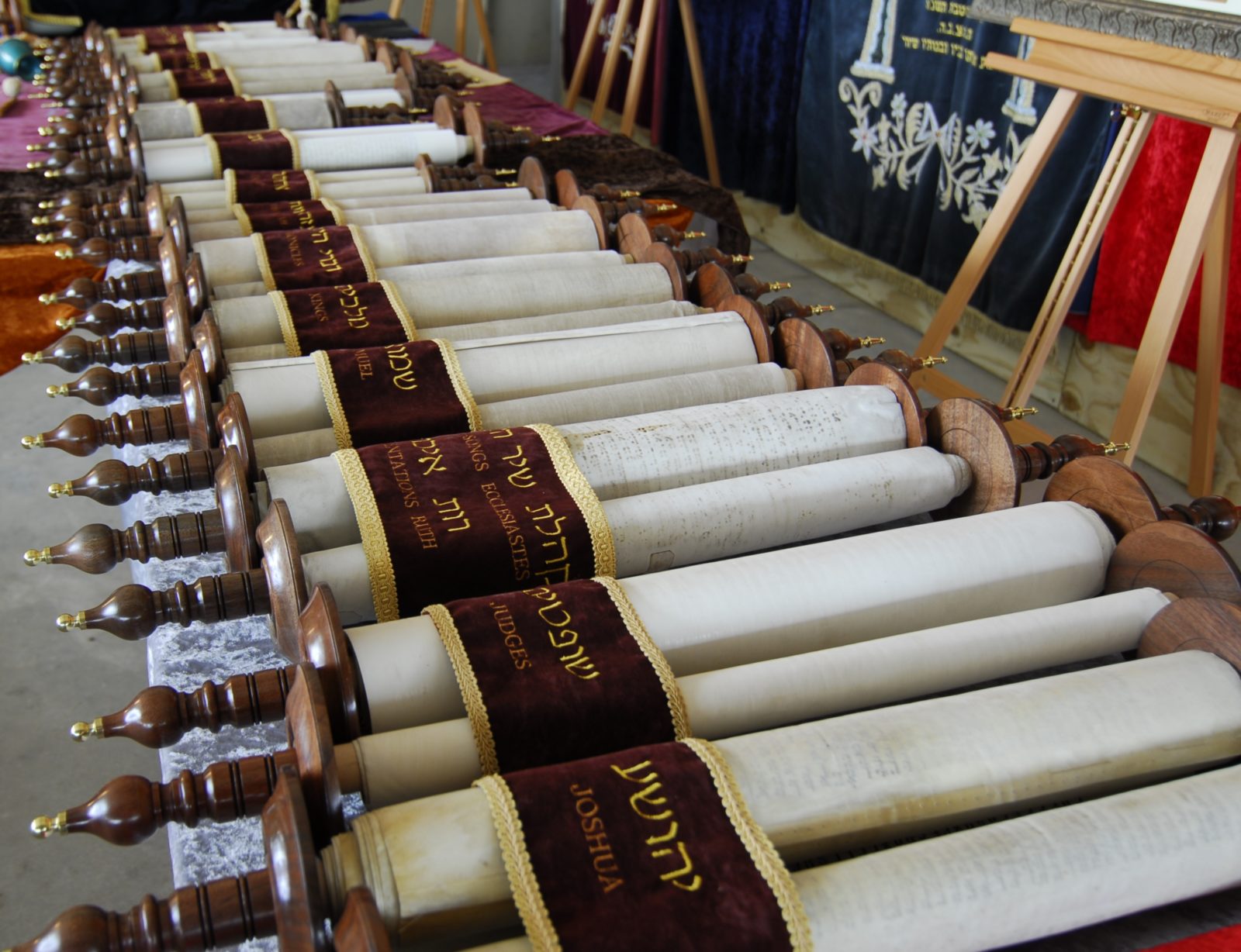 Early on in the Fellowship (and—hard to believe—exactly a month ago to the day that I am writing this), Adam, the executive director at Urban Adamah, led a class for us about brachot, “blessings” in the Jewish context. The class was comprised of several components starting with a mini-lecture by Adam in which he laid out the basis for why we say brachot and various perspectives on the role of the practice within Judaism. We also investigated some of the language around prayer and blessings employed in Judaism and discussed our own responses and personal relationships to that language. Much of my focus at the time was on the aspects of prayer and the Hebrew employed therein that I find personally alienating, including in particular some of the gendered, hierarchical, and anthropomorphizing language used in reference to God in traditional Jewish prayer formations. A good example of this is in the common Baruch ata Adonai formation utilized in many standard Jewish blessings:
Early on in the Fellowship (and—hard to believe—exactly a month ago to the day that I am writing this), Adam, the executive director at Urban Adamah, led a class for us about brachot, “blessings” in the Jewish context. The class was comprised of several components starting with a mini-lecture by Adam in which he laid out the basis for why we say brachot and various perspectives on the role of the practice within Judaism. We also investigated some of the language around prayer and blessings employed in Judaism and discussed our own responses and personal relationships to that language. Much of my focus at the time was on the aspects of prayer and the Hebrew employed therein that I find personally alienating, including in particular some of the gendered, hierarchical, and anthropomorphizing language used in reference to God in traditional Jewish prayer formations. A good example of this is in the common Baruch ata Adonai formation utilized in many standard Jewish blessings: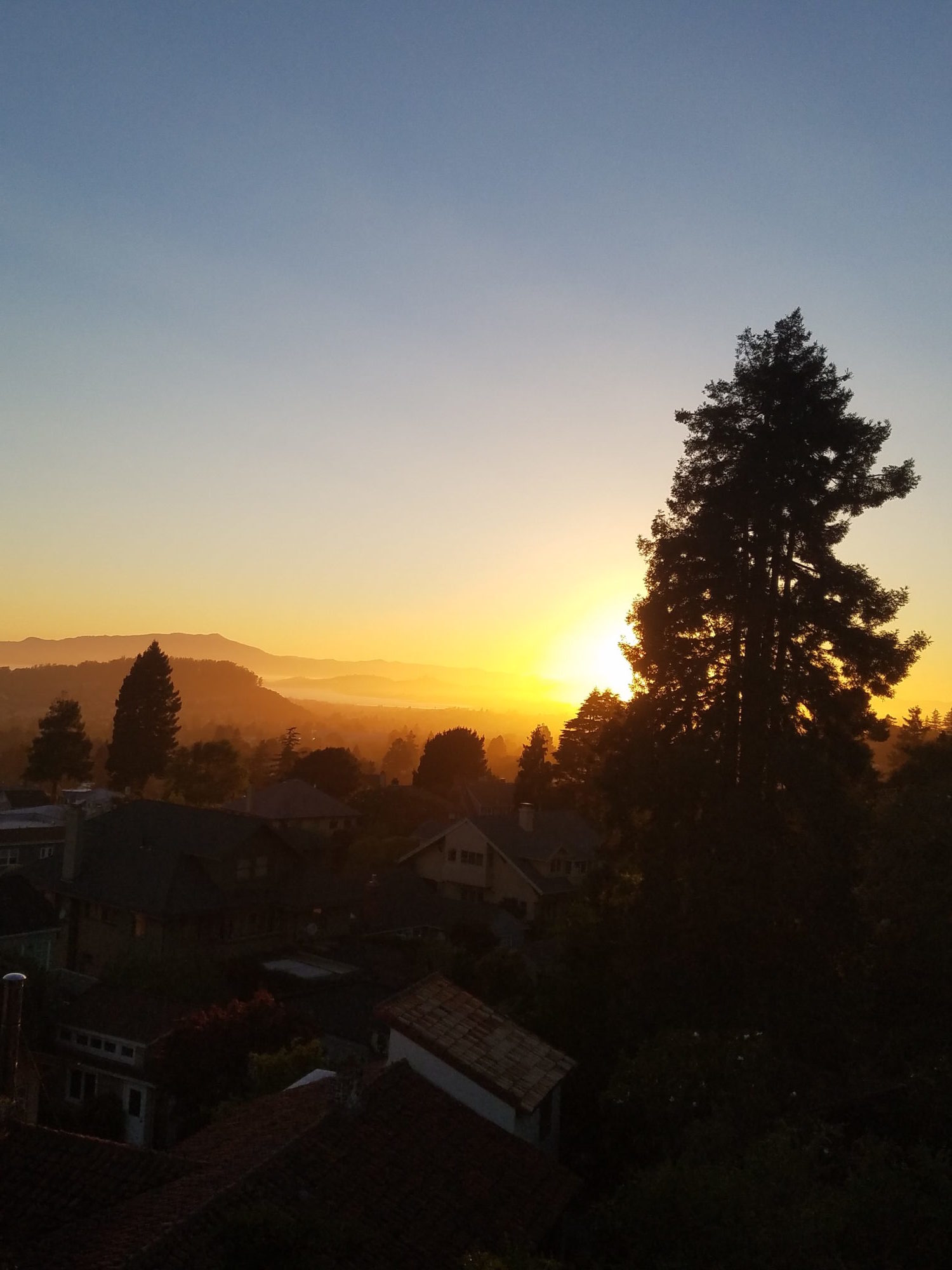 On Wednesday afternoon, the other Fellows and I went to Studio Am – The Jewish Studio Project where we spent a few hours with Rabbi Adina Allen talking about the intersections of Jewish spirituality, art-making, and justice work. In her introduction to the day’s activities, Rabbi Allen drew our attention to the fact that God’s first act in the Bible was one of creativity—in fact, it was the titanic creative act of producing the universe. The God of the Hebrew Bible is primarily a creative deity. Perhaps it makes sense, then, that in my experience, many of the moments where I’ve felt the most “transcendent,” when I’ve felt a certain power flowing through me, a connection to something higher and outside of myself, have been when I’ve lost myself completely in a piece of writing. It’s those long hours that pass like minutes, when the moon’s high up in the sky and I seem to know exactly where I should be going next in a piece without having to step back and think about it. When the story writes itself. It’s in those moments when I feel the least myself, the least rooted in the world around me, but the most awake and energized, the most connected to the deepest place within me, the place that is so easily blocked out by things like ego and daily life. Even before I started to become comfortable again with the idea of God, I’d say that in those moments I truly felt like I was tapping into something spiritual, something more meaningful than the limited physical world around me, and especially more meaningful than whatever words it was that I’d just put on the page. That’s the thing I’ve come to realize about writing: that, in writing, I am trying to capture and portray something that transcends materiality but am stuck with tools that themselves are only crude, false representations of the material world. It’s frustrating. It’s futile. So too is the search for God. I cherish both pursuits all the same.
On Wednesday afternoon, the other Fellows and I went to Studio Am – The Jewish Studio Project where we spent a few hours with Rabbi Adina Allen talking about the intersections of Jewish spirituality, art-making, and justice work. In her introduction to the day’s activities, Rabbi Allen drew our attention to the fact that God’s first act in the Bible was one of creativity—in fact, it was the titanic creative act of producing the universe. The God of the Hebrew Bible is primarily a creative deity. Perhaps it makes sense, then, that in my experience, many of the moments where I’ve felt the most “transcendent,” when I’ve felt a certain power flowing through me, a connection to something higher and outside of myself, have been when I’ve lost myself completely in a piece of writing. It’s those long hours that pass like minutes, when the moon’s high up in the sky and I seem to know exactly where I should be going next in a piece without having to step back and think about it. When the story writes itself. It’s in those moments when I feel the least myself, the least rooted in the world around me, but the most awake and energized, the most connected to the deepest place within me, the place that is so easily blocked out by things like ego and daily life. Even before I started to become comfortable again with the idea of God, I’d say that in those moments I truly felt like I was tapping into something spiritual, something more meaningful than the limited physical world around me, and especially more meaningful than whatever words it was that I’d just put on the page. That’s the thing I’ve come to realize about writing: that, in writing, I am trying to capture and portray something that transcends materiality but am stuck with tools that themselves are only crude, false representations of the material world. It’s frustrating. It’s futile. So too is the search for God. I cherish both pursuits all the same.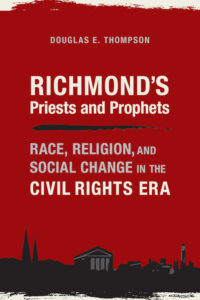 Race, Religion, and Social Change in the Civil Rights Era
Race, Religion, and Social Change in the Civil Rights Era
 Shabbat is not a tradition that we observed in my (half-) Jewish home growing up. Although it is a weekly holiday “guarded” (to borrow from Deuteronomy) throughout the millennia by generation after generation of Jews, Shabbat is still a relatively new observance in my life, and so tonight’s Kabbalat Shabbat (welcoming in the Sabbath) holds a double significance for me: as our community welcomes in the Sabbath for the first time together, I will be welcoming it as a new tradition into my life, one that I will perhaps observe in one way or another for the rest of my days. Given the double meaning for me of this particular Shabbat, and the conversations we’ve been having about the tradition today, I’ve been thinking a lot about its meaning and particular resonance in my life right now. In some ways, it seems to me, these three months at Urban Adamah are something like an extended Shabbat, a time for rest. This might seem like a strange claim given the fact that most of my time here is going to be spent doing farm work, but bear with me.
Shabbat is not a tradition that we observed in my (half-) Jewish home growing up. Although it is a weekly holiday “guarded” (to borrow from Deuteronomy) throughout the millennia by generation after generation of Jews, Shabbat is still a relatively new observance in my life, and so tonight’s Kabbalat Shabbat (welcoming in the Sabbath) holds a double significance for me: as our community welcomes in the Sabbath for the first time together, I will be welcoming it as a new tradition into my life, one that I will perhaps observe in one way or another for the rest of my days. Given the double meaning for me of this particular Shabbat, and the conversations we’ve been having about the tradition today, I’ve been thinking a lot about its meaning and particular resonance in my life right now. In some ways, it seems to me, these three months at Urban Adamah are something like an extended Shabbat, a time for rest. This might seem like a strange claim given the fact that most of my time here is going to be spent doing farm work, but bear with me.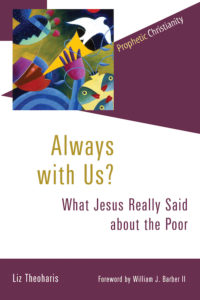 What Jesus Really Said about the Poor
What Jesus Really Said about the Poor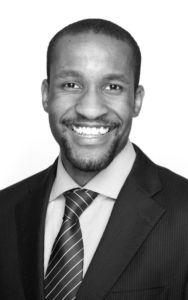 “Blessed and Highly Favored”: The Theological Anthropology of the Prosperity Gospel
“Blessed and Highly Favored”: The Theological Anthropology of the Prosperity Gospel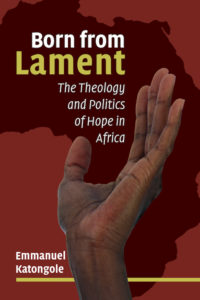 The Theology and Politics of Hope in Africa
The Theology and Politics of Hope in Africa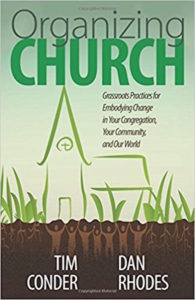 Grassroots Practices for Embodying Change in Your Congregation, Your Community, and Our World
Grassroots Practices for Embodying Change in Your Congregation, Your Community, and Our World